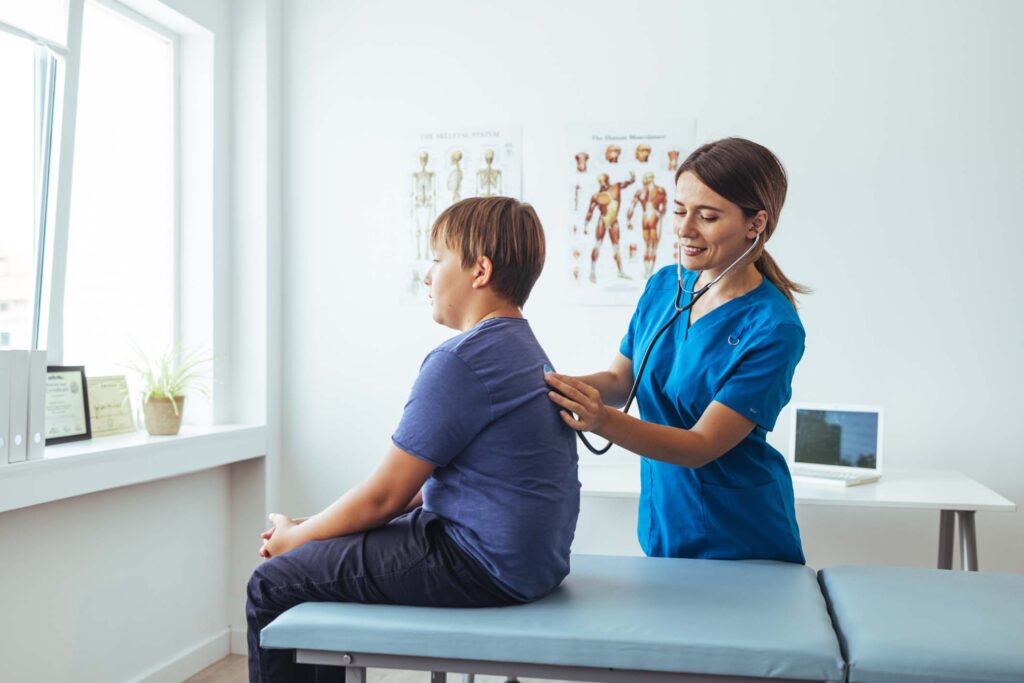
(July 7, 2025, DuBois, Pennsylvania) – Before long, student athletes participating in fall sports will be hitting the gyms and fields to practice for the season ahead. Whether your child participates in football or cheerleading, soccer or track, their safety on and off the field is one of your key concerns. A sports physical can help keep them healthy and injury free.
Why are sports physicals required?
“Sports physicals can uncover underlying health risks in children and adolescents before they become problems,” said Thomas Sisk, MD, a Family Medicine physician who is a sports medicine specialist in Finleyville, PA. “In addition, some pre-existing conditions could make the athlete more susceptible to injuries and it is better to know in advance so preventive measures can be taken.”
A sports physical provides a comprehensive evaluation of the athlete’s health status that serves as a baseline for monitoring changes in health. For example, if a runner injures their leg during a track event, the physician will have a detailed record of their health to help guide effective treatment.
“During childhood and adolescence, body changes occur rapidly and we can address injury prevention, nutrition and safe training practices during the exam,” said Dr. Sisk. “The physical also is a great time to help the child or teen understand how to care for their changing bodies to reduce injuries.”
If your child has an annual physical or recent sick visit, do they need a sports physical?
Annual exams and sick visits should never replace a sports physical. A sports physical evaluates the ability of the child or teen to safely participate in athletics while an annual physical is more comprehensive.
Who needs a sports physical?
The Pennsylvania Interscholastic Athletic Association (PIAA) requires all students who wish to participate in an interscholastic sport to have an initial pre-participation sports physical evaluation by a licensed physician of medicine or osteopathic medicine, a certified physician assistant, a certified registered nurse practitioner or a school nurse practitioner. Most club sports, travel leagues and other recreational sports organizations also require sports physicals before students can participate.
When should you schedule your student athlete’s sports physical?
It is best to check with your school district or sports organization for details about when the physicals need to be completed, but most require the physicals to be completed and submitted before the first practice. Some of those practices can begin as early as the first week in July. The start of the school year and the fall sports season is a busy time for primary care providers, so be sure to schedule your child’s sports physical early.
In addition to treating minor illnesses and injuries, the primary care physicians at Penn Highlands Healthcare Family Medicine clinics provide routine physical exams, school physicals and sports physicals. For more information or to schedule a sports physical, visit www.phhealthcare.org/familymedicine.
###
Penn Highlands Healthcare was officially formed in 2011 and is comprised of nine hospitals. Penn Highlands Brookville, Penn Highlands Clearfield, Penn Highlands Connellsville, Penn Highlands DuBois, Penn Highlands Elk, Penn Highlands Huntingdon, Penn Highlands Mon Valley, Penn Highlands Tyrone have served area communities for the past 100+ years. Penn Highlands State College is a new state-of-the-art hospital that opened in 2024. The health system’s business continuum also includes a home care agency, long-term care facilities and residential senior living communities, as well as durable medical equipment companies and retail pharmacies.
Penn Highlands Healthcare has evolved into an organization with approximately 6,200 employees in 150+ locations throughout 26 counties in Pennsylvania that include community medical buildings, outpatient facilities, surgery centers and physician practices. The facilities have a total of 1,396 inpatient, skilled nursing and personal care beds. The system, which has 849 physicians and 427 advanced practice providers on staff, offers a wide range of care and treatments with specialty units for cancer, cardiovascular/thoracic, neurosurgery, pulmonology, neonatal and high-risk pregnancy patients. Being focused on what is important – patients and families – makes Penn Highlands Healthcare a great choice for healthcare in the region.

